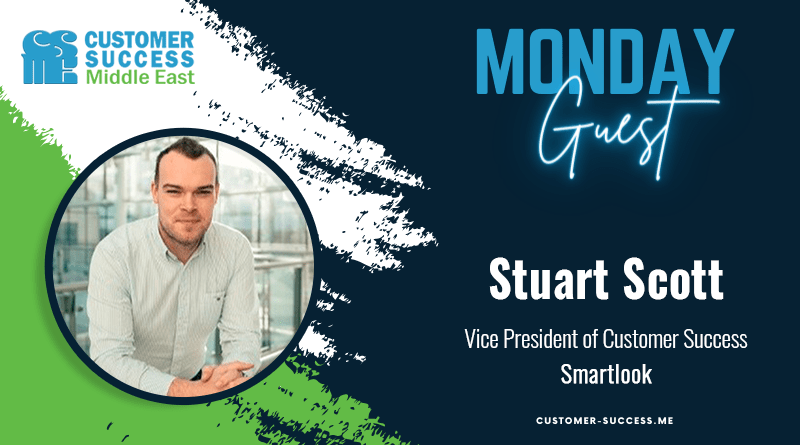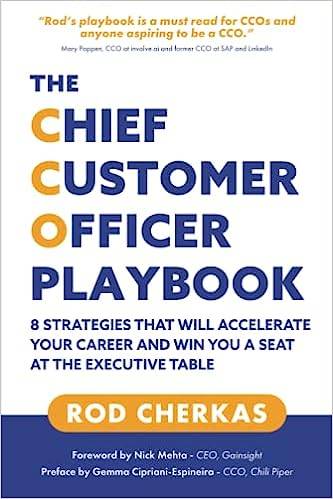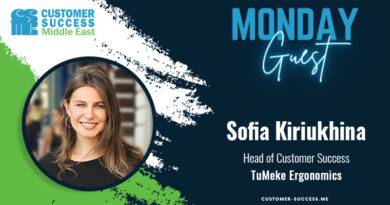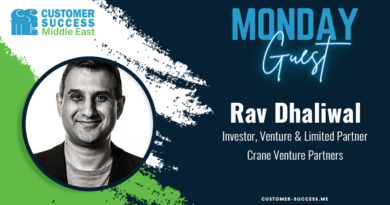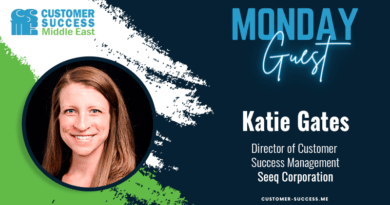Monday Guest Stuart Scott
Get to know Stuart Scott
By: Mohammed Alqaq | June 26, 2023
My name is Stuart Scott & I’m located in Newcastle Upon Tyne, UK, with my 10-year-old boy & crazy 4-year-old Sprokerpoo! I am currently the VP of Customer Success at Smartlook.
We provide a combined quantitative & qualitative analytics solution for web and mobile helping over 200,000 businesses of all sizes and industries answer the “whys” behind users’ actions.
We asked Stuart to take us through a journey telling us about his career path, how he spends his workday, what advice he can share with someone starting as a customer success manager, and many other questions.
Enjoy reading this interview
Tell us about your career path?
I started my career in the Sales world at Sage, a FTSE100 company, before moving into the Key Account Management space. Whilst continuing my career at Sage, I worked with PWC to implement & drive forward the PERFORM methodology & it was at this time I found my true passion, which was Customer Success.
I then moved into my first global role at Compleat Software, looking after the Customer Success function & I then moved into my current role at Smartlook, where I’m now responsible for both the Success & Support functions.
How did you join Customer Success?
As mentioned above, when I was given the opportunity to lead the Key Account Management function at Sage, which combined with the on-going work we did with PWC, gave me my first experience in the CS world & was ultimately the key turning point in my career.
How would you describe the ideal CSM candidate?
The ideal CSM in my eyes would show the below skill sets:
Strong Communication Skills: CSMs must be excellent communicators, both verbally and in writing. They need to be able to explain technical concepts to non-technical customers and provide clear and concise instructions.
Customer-centric Attitude: CSMs must have a customer-centric attitude, and put the customer’s needs first. They should be able to empathize with customers and understand their pain points.
Industry Knowledge: An ideal CSM candidate should have experience in the industry they are working in. This allows them to understand the customer’s business needs and provide targeted solutions.
Technical Skills: CSMs should be proficient in the use of software and have technical skills that allow them to troubleshoot customer issues.
Time Management: CSMs need to be able to manage their time effectively, and prioritize tasks based on customer needs and business impact.
Analytical skills: CSMs should be able to analyze customer data and feedback to identify trends and make data-driven decisions. They should also be able to identify areas for improvement in the company’s product or service offerings.
Collaborative mindset: A successful CSM should be able to work effectively with cross-functional teams, including sales, marketing, and engineering. They should be able to communicate effectively with other teams and collaborate on customer-related initiatives.
Empathy: The ideal CSM should be empathetic and able to understand the customer’s perspective. They should be able to put themselves in the customer’s shoes and work to resolve issues in a way that is beneficial to both the customer and the company.
What one piece of advice would you give to someone just starting out as a Customer Success Manager?
As a CSM, my key piece of advice would be to focus on your relationship-building skills. Becoming a trusted advisor to your customer is something that is said, at times, in such a flippant way, but is actually something extremely difficult to achieve, but once achieved can be the number 1 difference between success & failure.
Trusted advisor to your customer is something extremely difficult to achieve, but once achieved can be the number 1 difference between success & failure.
Can you take us on a journey describing what your workday looks like?
Working remotely, most of my days are spent on multiple Google Meet/Zoom calls. This is normally covering our weekly C-level calls, project work, 1-2-1s & as many customers calls as I can, which alongside my 1-2-1’s rocks, are the most important calls of the week.
I also make sure I have my different rocks (non-negotiable blocks) in my diary to cover admin/reflection time & ensure we have a weekly team huddle. These rocks are so important to ensure I don’t get overwhelmed with the number of tasks ongoing for either myself or my department leads. 🙂
What makes you feel inspired or motivated?
I love people management & striving to be the best leader is something that is my number 1 motivation. Seeing my team succeed or break down barriers is the area of my job that gives me the biggest satisfaction.
Outside of my team, my 10 years old son is all the inspiration I need & equally the same level of motivation to be my best self & ensure I’m hopefully a role model he can be proud of, as he eventually moves into the business world.
What’s one thing that people are generally surprised to find out about you?
I’m a huge football fan & support Newcastle United (the greatest team of all time) but I’m also a secret Harry Potter fan! I know, not really a big surprise to anyone who has worked with me before, but something you probably wouldn’t guess right away, unless you’re on a Zoom call with me & I’m drinking coffee from my famous Potter mug!
Who do you look up to the most?
Keeping it in the business world, my number 1 inspiration in the Success world & the person (I don’t think really knows it that much) who sparked my true passion for Customer Success is Chris Rauch (Chief Customer Officer.), but I also have many other inspirational leaders I have worked with over my career.
What are your top 3 priorities now?
– Preparing/reviewing Q2 close/learns & finalizing Q3/H2 plans
– C-Level OKRs offsite
– Continue & finalize our preparation to join the Cisco family
What advice would you give to Customer Success Managers to grow and develop their careers?
If you haven’t already, develop a key understanding of your company’s products/services & ensure you couple this with a customer-focused mindset. Once you have this, don’t stop, continuous development is critical in the CS space – we have such an amazing community, don’t be afraid to ask for help in areas you’re struggling or don’t understand & finally, get a mentor!
I have one of the best in the industry, Alex Farmer & even if it is just a 30min call, once per month, it’s a platform for you to be vulnerable & ask the Questions you might not want to ask your leader.
What’s your favorite book, and why?
The Chief Customer Officer Playbook by Rod Cherkas. It shines the spotlight on the importance of the Customer Success world & allows professionals like myself to access a huge bank of knowledge from one of the most highly respected figures in the industry.
» Check out the 10 Books a CSM should read to advance and improve their skills.
Have you had your “I’ve made it” moment yet?
Of course, I’ve reviewed my fellow professionals’ responses to this, but I can’t change my response when I say – yes I’ve had moments where I’ve thought “Wow, I can’t believe it, I’ve actually done it” but to say I’ve then remained in that mindset for more than a day would be lying.
I move on to the next challenge & keep driving forward my learning. No one knows everything, so we all have something new to learn the next day & the next goal to achieve.🙂
What should I have asked you but didn’t?
You’ve asked some great questions.
Where can people go to find out more about you?
I would love to connect and engage with people on LinkedIn.
Thank you, Stuart, for sharing your knowledge and for the opportunity to know you more.
Do you have a Customer Success Leader, Expert, or Influencer you would like to know more about?

